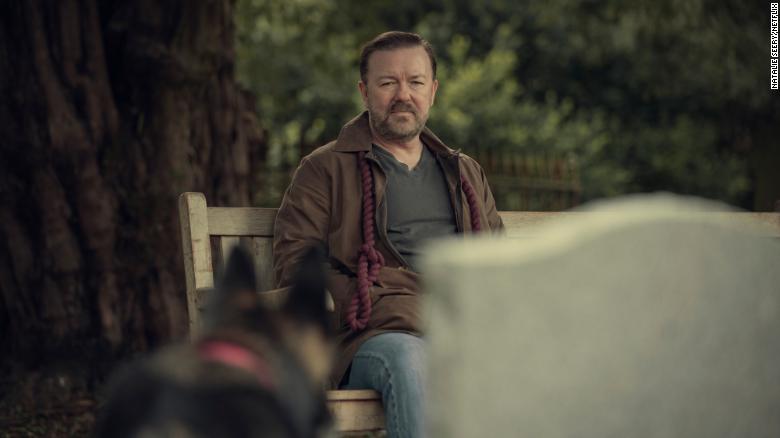Viewers Vs Critics through the lens of ‘Afterlife’
A great critic once said, ‘we thrive on negative criticism…… but the bitter truth we critics must face is that, in the grand scheme of things, the average piece of junk is probably more meaningful than our criticism designating it so’. Not every show is going to be a cinematic work of art, yet, to the everyday viewer, their intent is not to pick apart shows scene by scene and compare it, but to just enjoy and escape. Shows like Afterlife consume the viewer and get high ratings because the premise is honest, realistic, and exists for itself. Ricky Gervais’ show doesn’t pander to clichés and tried and tested romantic plot lines, but instead exists within its own world reflecting real issues, grief and expectations. I think to call such a show ‘trite’ is blind snobbery. I saw nothing but the fresh and profound storylines within each character, storylines that weren’t there to fill time or because Tony’s (Ricky Gervais) character was lacking, but because everyday people have their own lives and problems. When we compare Kath’s (Diane Morgan) heart-wrenching loneliness compared to shows such as Emily in Paris, which does little to deepen the humanity of its side characters, it’s almost outrageous that Ricky Gervais’s Afterlife is receiving unreasonable criticism for being ‘dull’. As someone who digests a lot of television, I, without doubt, listen to the 77% audience score and not that of the critics’ 55%. These are viewers, without pay, who are blunt and candid with their opinions.
The last thing [the audience] want is something they cannot connect with
Afterlife and shows like it aren’t made with the intention of being a Golden Globe nomination grab, and you can tell. Heart-warming, realistic shows stimulate the everyday viewer, who is arguably the most important critic in the TV industry. We understand now how important representation in the media is for those watching at home, illustrating real experiences and stories. Millions of those watching TV aren’t overpaid critics whose job it is to tear apart new releases but spend 40 hours a week working mundane jobs. The last thing they want is something they cannot connect with. Even when it comes to Emily in Paris with the social discourse being that the show is bad quality, people are happy to admit that it is their ‘guilty pleasure’. A breath of fresh air when it comes to TV doesn’t have to be something ground-breaking, edgy, or critically acclaimed, but something people can enjoy with little stress or thinking required. Critics often highlight shows that are convoluted and hard to get into because they’re for the more problem-solving viewer, but this isn’t enjoyable for most of us who just want a show that is what it sets out to be.
Tony doesn’t defeat his grief but learns to live a life that’s meaningful without his departed wife. The discourse within social media post-Afterlife is one of gigantic relief that Tony remained a single widower, which many felt was in keeping with his narrative. A lot of shows, such as How I Met Your Mother (HIMYM) make marriage and love seem almost a passing element of life as Ted ends up with Robin again after his wife’s passing, making the entire show seem tedious. When we contrast this to Tony and Emma (Ashley Jensen), their relationship is deep yet respectful, frustrating and honest. Ted from day one had intentions toward Robin and her being the end girl somewhat erases what little time the show gave to Tracy and her influence as Mrs Mosby. This is because the ‘girl next door’ narrative is considered to be what the viewer wants to see for the main character – but often it cheapens rather than deepens their journey. Ted’s core story is about a hopeless romantic looking for ‘the one’; to then conclude the show by ending up with someone else other than his wife seems to contradict the potency and legitimacy of his entire character. Whilst I enjoyed HIMYM, Tony’s unfaltering love for Lisa, who he had met later in life, is hopeful for those still struggling to find love or those battling with the idea that they must ‘move on’. Ending up with someone is now seen as a must within a lot of TV, yet often when a relationship seems forced viewers turn off.
Audiences aren’t willing to take risks with their time nor money when it comes to entertainment
Also, often I think critics forget the impact the pandemic has had on how we consume television and film. Individuals are reluctant to waste their time watching shows that are either advertised poorly, and thus don’t show the show’s premise clearly, or seem like something they may not instantly connect with. Especially after lockdown made us realise how many of us are unhappy in our jobs or are paid little for what we do, when it comes to film, going to the cinema seems a waste of money if it’s not for something you know you will enjoy. Ridley Scott’s response regarding ‘fucking cellphones’ when discussing his box office flop The Last Duel has illustrated that audiences aren’t willing to take risks with their time nor money when it comes to entertainment (regardless of whether critics rated it 85% on rotten tomatoes). People want comfort and nostalgia they can either relate to or reminisce with. Spiderman: No Way Home did so well in the box office because not only is the Marvel franchise something most of us grew up with, but the addition of Tobey Maguire and Andrew Garfield, though expected due to fandoms predictions and deductions, brought together an exciting reason to want to watch on the big screen. Superhero films, in general, contain an easy dialogue with fun scenes. They aren’t usually seen as being Oscar-worthy as they live within a realm that consistently dishes out what their loyal fanbases want, even if critics aren’t happy.


Comments